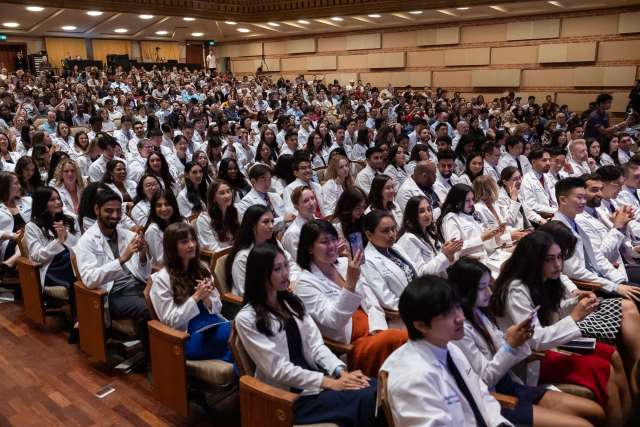One-hundred seventy-eight first-year medical students received their white coats on Friday, Sept. 6, at Royce Hall on the UCLA campus. The white coat symbolizes trust, compassion, and professionalism, and the ceremony marks the beginning of a student’s medical school journey. While it’s impressive for anyone to get accepted into the David Geffen School of Medicine at UCLA, the students below overcame added obstacles.
The following students are part of the PRIME program, a UC-wide effort dedicated to training socially conscious doctors who plan to work in under-resourced communities.
He lost his mother to cancer, now he’s motivated to heal others
Andy Garcia learned at a young age how disease can take a toll on the body. When he was just 5 years old, his mother was diagnosed with breast cancer. He was profoundly impacted by watching her lose her hair and grow increasingly fatigued from chemotherapy, while remaining courageous throughout.
Witnessing his mother’s valiant fight against an unrelenting disease – along with growing up in Porterville, an under-resourced agricultural community in the San Joaquin Valley where the Spanish-speaking farmworker population often struggle to access high-quality, language-concordant care – led him on a path to becoming a culturally sensitive physician determined to heal.

Although his mother went into remission after her initial diagnosis, her breast cancer returned several times throughout her life. Despite having both breasts surgically removed, her cancer metastasized, and she passed away in October, 2023.
“It was incredibly challenging, the hardest time of my life,” Garcia said. “But I’m driven to treat patients as a way to honor her legacy.”
Garcia plans to go into internal medicine – a specialty that would allow him to see patients recurringly and develop lasting relationships. Knowing that his small hometown community is still in need of Spanish-speaking doctors, he’s eager to return and serve the community that inspired his journey toward becoming a physician.
An incoming first-year tackles health disparities alongside her sister
A first-generation citizen whose parents immigrated from Jalisco, Mexico, Erika Venegas came from a mixed-status family that experienced financial stress and tension. Venegas’ grandmother, who lived in Mexico, took over as a caretaker for Venegas and her sister, and they bounced between growing up in Chula Vista, California, and Tijuana, Mexico. Living in a border community, Venegas saw disparities in health care as she watched her family members and other Chula Vista residents cross the border frequently to be seen by Spanish-speaking doctors, get more affordable care, and avoid the daunting U.S. health care system altogether.

Venegas’ older sister, Melissa Venegas, always supported and looked out for her. Beyond providing emotional support, Melissa has been a career role model – she attended UCLA for an undergraduate degree and is now in the PRIME program at DGSGOM. Venegas has followed in her footsteps and is now a PRIME.
“Having a piece of home here with me in LA is just really motivating me, and I can see it being even more meaningful to me on days where you know the journey is going to be very challenging and tough,” Venegas said.
While having a sister in the program is comforting, Venegas is also driven by her passion to go back and serve the under-resourced community where she grew up.
The following student is part of Urban Health Equity Pathway, a program that prepares future doctors who want to work on urban health policy and advocacy.
Medical student wants to provide comprehensive care
Growing up in Half Moon Bay, in Northern California, Andrea Guevara-Castro had a glimpse into the language and systemic barriers her Latinx community faced when accessing health care. These early experiences showed her that health care goes beyond the exam room.
Intending to help under-resourced patient populations, Guevara-Castro volunteered for Clínica Martín Baró – a student-run clinic that serves underprivileged community members in San Francisco. Guevara-Castro said she was able to treat patients holistically and connect them to proper resources impacting their health, versus only focusing on treating their symptoms. If a patient was looking for housing resources, for example, she would connect them with local housing organizations.

Although she’s starting a new chapter, she plans to continue working with the community while in medical school.
“I'm also exploring a lot of different interests that I hope to align with clinical care, like the advocacy side, the health policy, public health sectors,” Guevara-Castro said.



